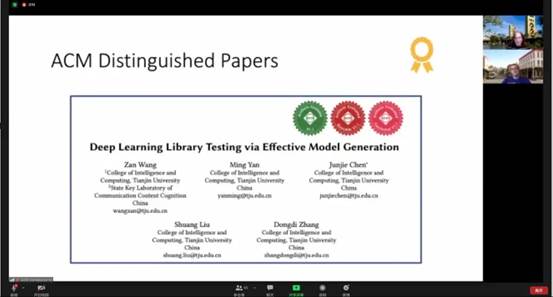The 28th ACM Joint European Software Engineering Conference and Symposium on the Foundations of Software Engineering (ESEC/FSE 2020) was held online from November 6 to 16, 2020.
The paper titled “Deep Learning Library Testing via Effective Model Generation” by Software Engineering Research Team from Tianjin University’s College of Intelligence and Computing won the ACM SIGSOFT Distinguished Paper Award of ESEC/FSE 2020. The authors of the paper include Ming Yan (First student author), Prof. Zan Wang, Prof. Junjie Chen (corresponding author), Prof. Shuang Liu and Dongdi Zhang (graduate).

This paper proposes a novel deep learning library testing approach via guided mutation, called LEMON. LEMON is the first of its kind to utilize model mutation and heuristic-based strategy to generate a large number of deep learning models as test inputs of deep learning libraries. Then, differential testing is adopted as test oracle for testing deep learning libraries. The extensive experiments further demonstrate the effectiveness of LEMON based on four popular deep learning libraries, i.e., TensorFlow, Theano, CNTK, and MXNET.

Three other papers from the Software Engineering Research Team were accepted by ESEC/FSE 2020, including Real-time Incident Prediction for Online Service Systems (by Prof. Junjie Chen), Identifying Linked Incidents in Large-scale Online Service Systems (by Prof. Junjie Chen), How to Mitigate the Incident? And An Effective Troubleshooting Guide Recommendation Technology for Online Service Systems [Industry track] (by Prof. Jiajun Jiang, Prof. Junjie Chen).
ESEC/FSE is one of the most top-tier international conferences in the area of software engineering. It brings the researchers, practitioners, and educators in this area together to introduce and discuss their latest ideas, innovations, research trends and experience sharing. In the meanwhile, it is also a CCF-A international academic conference in software engineering.
Paper Link:
https://drive.google.com/file/d/16bd0Cs1L02Ejy2LGo8LNVvivhIhJxI0v/view
By Li Na from the College of Intelligence and Computing


